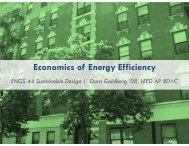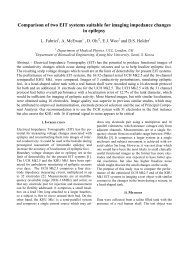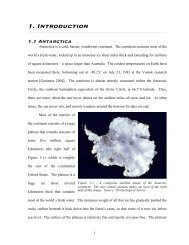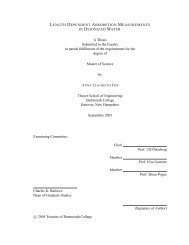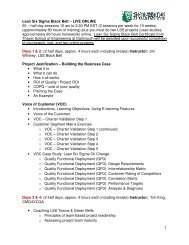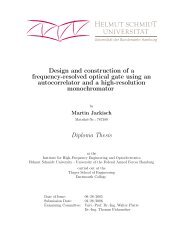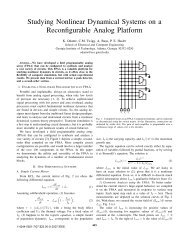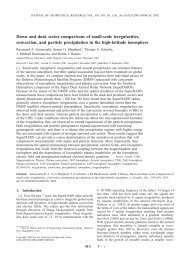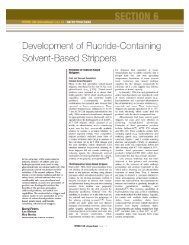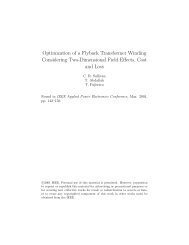Courses Programs - Thayer School of Engineering - Dartmouth ...
Courses Programs - Thayer School of Engineering - Dartmouth ...
Courses Programs - Thayer School of Engineering - Dartmouth ...
You also want an ePaper? Increase the reach of your titles
YUMPU automatically turns print PDFs into web optimized ePapers that Google loves.
graduate courses<br />
ENGS 172 Climate Change and <strong>Engineering</strong><br />
Offered: 11S, 12S: 2A<br />
The current assessment by the Intergovernmental Panel on Climate Change<br />
(IPCC) <strong>of</strong> the World Meteorological Organization (WMO) and the United Nations<br />
Environment Programme (UNEP) will be examined. The course will begin by scrutinizing<br />
the scientific basis <strong>of</strong> the assessment. Subsequently, regional and global impact<br />
projections will be examined. The technological options will be examined with<br />
respect to research and capitalization priorities, both corporate and governmental.<br />
Finally, the possibilities for novel governance structures based on a scientific<br />
understanding will be examined. Weekly critical presentations <strong>of</strong> the source material<br />
will be required. The course will culminate in the preparation, presentation, and<br />
refinement <strong>of</strong> a term paper <strong>of</strong> the student’s choosing.<br />
Prerequisite: Junior or senior standing in the Science Division, graduate standing in<br />
engineering or science, or permission <strong>of</strong> instructor<br />
Instructor: Lynch<br />
ENGG 173 Energy Utilization<br />
Offered: 11W, 12W: 10A<br />
Industrial societies are presently powered primarily by fossil fuels. Continuing to<br />
supply energy at the rate it is now used will be problematic, regardless <strong>of</strong> the mix <strong>of</strong><br />
fossil fuels and alternatives that is used; yet western consumption patterns spreading<br />
through the rest <strong>of</strong> the world and other trends portend large increases in demand<br />
for energy services. Increased energy efficiency will be essential for meeting these<br />
challenges, both to reduce fossil-fuel consumption and to make significant reliance<br />
on alternatives feasible. Technical issues in efficient systems for energy utilization<br />
will be surveyed across major uses, with in-depth technical analysis <strong>of</strong> critical factors<br />
determining possible, practical, and economical efficiency improvements in both<br />
present technology and potential future developments. Areas addressed include<br />
lighting, motors and drive systems, heating, ventilation and air conditioning,<br />
transportation, appliances and electronics.<br />
Prerequisties: ENGS 22 and at least two <strong>of</strong> the following: ENGS 25, 32, 34, 44, 52, 76,<br />
104, 125, 150, 155, 156, and 184, or permission. ENGS 25 is strongly recommended.<br />
Instructor: Sullivan<br />
ENGG 174 Energy Conversion<br />
Offered: 10F: 11<br />
This course will address the science and technology <strong>of</strong> converting key primary energy<br />
sources—fossil fuels, biomass, solar radiation, wind, and nuclear fission and fusion—<br />
into fuels, electricity, and usable heat. Each <strong>of</strong> these topics will be analyzed in a<br />
common framework including underlying fundamentals, constraints on cost and<br />
performance, opportunities and obstacles for improvement, and potential scale.<br />
Prerequisites: ENGS 22 and at least two <strong>of</strong> the following: ENGS 25, ENGS 32, ENGS 34,<br />
ENGS 36, ENGS 44, ENGS 52, ENGS 76, ENGS 104, ENGS 125, ENGS 150, ENGS 155,<br />
ENGS 156, and ENGM 184, or permission. ENGS 25 is strongly recommended.<br />
Instructors: Lynd, Laser<br />
103



